|
|
|
Sort Order |
|
|
|
Items / Page
|
|
|
|
|
|
|
| Srl | Item |
| 1 |
ID:
090419
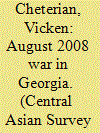

|
|
|
|
|
| Publication |
2009.
|
| Summary/Abstract |
Following the five days' war between Georgia and Russia, a highly politicized debate began about 'who started the war'. While this debate is far from over, it is important to analyse whether the 2008 war marks an important evolution in the series of conflicts that started in the Caucasus simultaneously with the weakening and collapse of the Soviet Union. While in the late 1980s and early 1990s the conflicts were the result of mass mobilization around the banner of the nation, marking a revolutionary period of paradigm shifts, the 2008 war was much closer to classical wars between states and their centrally commanded armies. The direct Russian military intervention, Moscow's recognition of Abkhazia and South Ossetia as 'independent' states, further modifies the nature of the Caucasus conflicts. The 2008 war also reveals how much the Georgian state has evolved since the Rose Revolution, from one described as 'weak state' to a state capable of surviving a military defeat without internal collapse.
|
|
|
|
|
|
|
|
|
|
|
|
|
|
|
|
| 2 |
ID:
090420
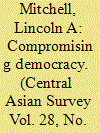

|
|
|
|
|
| Publication |
2009.
|
| Summary/Abstract |
This article argues that the since the Rose Revolution, the Georgian government led by President Mikheil Saakashvili has created a false dichotomy between democracy and state building. They have prioritized the latter. Initially, in areas such as reducing bureaucracy, combating petty corruption, improving tax collection, service delivery and infrastructure, the government succeeded in rebuilding the Georgian state. However, because issues of democracy were ignored, efforts to strengthen the Georgian state were not as successful as they might have been. Moreover, the absence of sufficient democracy has contributed to poor decision making, most notably in the run-up to the August war, which ultimately has undermined the major state building accomplishments in Georgia since 2004. Accordingly, any efforts to repair the damage from that war and rebuild the state will be unsuccessful unless they incorporate meaningful democratic reforms.
|
|
|
|
|
|
|
|
|
|
|
|
|
|
|
|
| 3 |
ID:
090424
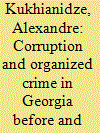

|
|
|
|
|
| Publication |
2009.
|
| Summary/Abstract |
The Soviet collapse in 1991 led to political turmoil, armed conflicts, rampant corruption, and to the growth of organized crime and smuggling in post-Soviet Georgia. Professional criminals called 'kanonieri kurdebi' ('thieves-in-law') captured the state, and criminalization of the government and law-enforcement structures caused a deep political crisis in the country and finally, revolutionary change of the political leadership. Massive arrests of most corrupt government officials, 'thieves-in-law', and other key criminals followed the Rose Revolution in 2003-2005. The new leadership implemented anti-corruption policies and law-enforcement reforms. The crime rate was reduced significantly. Yet, despite anti-corruption reforms, there continue to be repeated accusations of top government officials' involvement in 'elite corruption'. The lack of democracy and threats coming from Russia are the main reasons why Georgia remains a country of high risk, vacillating between stability and turmoil. Turmoil generates corrupt government and provides professional criminals with opportunities.
|
|
|
|
|
|
|
|
|
|
|
|
|
|
|
|
| 4 |
ID:
090418
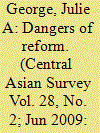

|
|
|
|
|
| Publication |
2009.
|
| Summary/Abstract |
Was the South Ossetian war of August 2008 inevitable? Although conditions between the Georgian, South Ossetian and Russian political leadership had hardened into seemingly intractable positions from 1991-2008, the manner and timing of the August war were not certain. Analysts of the events, seeking to show Georgian culpability, argue that the personality and authoritarian style of Mikheil Saakashvili led to a nationalistic policy that aimed to undermine the interests of Georgia's national minorities. While the Georgian national minority policy was not overtly chauvinistic and certainly not indicative of a full-scale crackdown on the secessionist territories, particular centralizing characteristics of Georgia's state-building programme, some of them necessary reforms after over a decade of political stagnation under Shevardnadze, contributed to the increasing tensions that were part of the lead up to the South Ossetian war.
|
|
|
|
|
|
|
|
|
|
|
|
|
|
|
|
| 5 |
ID:
090416
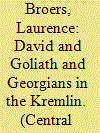

|
|
|
|
|
| Publication |
2009.
|
| Summary/Abstract |
This article presents a post-colonial perspective on post-Soviet conflict in Georgia. Patterns of group classification and incorporation in the tsarist and Soviet eras are charted, to argue that Soviet Georgia was incorporated as a series of layered peripheries, differentiated not only by ethnic affiliation with titular groups, but also by the mode of incorporation into the wider political unit of which they formed part. This produced contrasting articulations of the link between language, identity and power among Georgians, Abkhazians and Ossetians, mediating conflicting reactions to the prospect of post-Soviet devolution. Finally, the nature of the post-Soviet sovereignty attained by Georgia, Abkhazia and South Ossetia is considered.
|
|
|
|
|
|
|
|
|
|
|
|
|
|
|
|
| 6 |
ID:
090422


|
|
|
|
|
| Publication |
2009.
|
| Summary/Abstract |
The article discusses the problems of the successes and the failures of Georgia's post-revolutionary economic development. Amongst the positive results, the significant increase of national budget revenues and the overcoming of the energy crises should be emphasized, both of which were achieved by the fight against domestic internal corruption. At the same time, mistakes in terms of both the building of a democratic state and economic policy were made. Making the judiciary an appendage to the General Prosecutor's Office and the executive branch, the government's control of the media and its defiance of property rights, including extra-judicial decisions to demolish privately owned residential houses, are among the most serious errors of Georgia's post-revolutionary development. Despite its anti-Russian rhetoric, the new government has openly welcomed Russian investments into Georgia's economy. After the Russian aggression and under the impact of the global financial crisis, Georgia finds itself in a more complicated situation. International financial aid of US$4.55 billion, which was pledged at the international donors' conference held in Brussels in October 2008 for the reconstruction of post-war Georgia, may enable the country to avoid the banking and currency crisis.
|
|
|
|
|
|
|
|
|
|
|
|
|
|
|
|
| 7 |
ID:
090417


|
|
|
|
|
| Publication |
2009.
|
| Summary/Abstract |
This article attempts to explain how the Georgian state sought to manage ethnic diversity at the same time as (re-)building state institutions within a (nominally) democratic framework, from the collapse of Soviet power to the present day. It is suggested that the explanation for the slow and uneven progress in accommodating national minorities within the Georgian state derives from four principal factors: first, the collapse of the Soviet state and the consequent inability of the newly independent state to provide basic public goods; second, the lack of a 'civic' model for the accommodation of minorities; third, the continuation of the Soviet norm of arbitrary exercise of power by leaders, which is ill-suited to accommodating diversity and resolving conflict; and, finally, the Soviet legacy of ethnofederalism, which carved out three autonomous territories - Abkhazia, Achara and South Ossetia - from within Georgia that would (violently, in the case of Abkhazia and South Ossetia) resist the encroachments of the new Georgian state, and would later (in the case of South Ossetia) provide a pretext for military conflict between Russia and Georgia.
|
|
|
|
|
|
|
|
|
|
|
|
|
|
|
|
| 8 |
ID:
090421


|
|
|
|
|
| Publication |
2009.
|
| Summary/Abstract |
Change of power through elections remains an unattainable goal of Georgian democracy. To a great extent, presidential power depends on public support. How does the public view Saakashvili? What changes occurred during his rule? To what extent has he fulfilled his promises? What are the views of the supporters of different political actors? This analysis uses surveys carried out by the Institute of Policy Studies prior to and after Saakashvili's elections. It reveals certain achievements in state building and the crystallization of a positive orientation towards the West. But many hopes have turned into disappointments. Disrespect for individual rights, inequality before the law, fear of a renewed war, poverty and the loss of homes are realities. Democracy has not been built. Disillusionment and the existence of the two realities, one seen by Saakashvili supporters and another by all others, is obvious. Integration of these two visions must be the goal of the government.
|
|
|
|
|
|
|
|
|
|
|
|
|
|
|
|
| 9 |
ID:
090425


|
|
|
|
|
| Publication |
2009.
|
| Summary/Abstract |
The Abkhazian and South Ossetian perspectives on the fighting between Georgians and South Ossetians in August 2008 could not be heard above the noise generated around the geopolitical implications of the larger Russian-Georgian clash. The population of Abkhazia experienced the violence in South Ossetia as though it was occurring on their own territory. This confirmed their complete lack of trust in the Georgian government's commitment to peaceful resolution of the conflicts. In addition, they were disappointed with what they regarded as the international community's absence of criticism of Georgia's actions and lack of concern for the safety and well-being of the South Ossetians. Russia's recognition of South Ossetia's and Abkhazia's independence has taken the question of Georgia's territorial integrity off the negotiation table indefinitely. It also has set back the formal peace process with both South Ossetia and Abkhazia. An essential way forward, toward establishing trust as a necessary foundation for progress in the political negotiations, would be for the US and other interested countries to engage with the people of Abkhazia and South Ossetia at all levels, demonstrating credible and consistent concern for the safety and well being of all the people affected by the conflict.
|
|
|
|
|
|
|
|
|
|
|
|
|
|
|
|
|
|
|
|
|